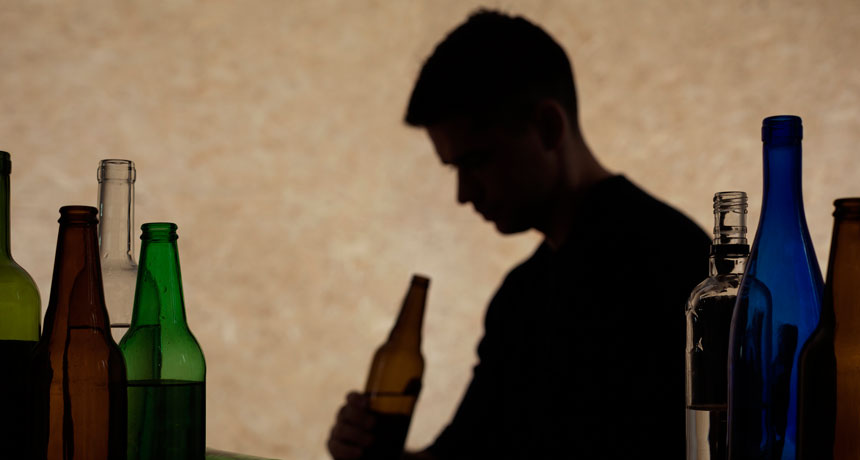Teen drinking may damage ability to cope with stress
Frequently drinking lots of alcohol harms how the brain reacts to stress, especially in male teens

Teen boys who indulge in binge drinking may suffer side effects that last well into adulthood, a study in rats suggests.
KatarzynaBialasiewicz/iStockphoto
What’s the harm in a little beer? That’s usually how it starts. Teenagers often are tempted to try some alcohol. Many give in when they are just 12 to 16 years old. Although they know they should avoid alcohol, many don’t. Some will soon end up drinking a lot — and often. This is called binge drinking. And when it begins at a young age, it can have lasting impacts. That’s the conclusion of a new study in rats.
Binge drinking refers to downing several drinks within a short period of time.
And in the United States, binging is common among underage drinkers. Those who are 12 to 20 years old account for 11 percent of all alcohol that’s drunk, according to the U.S. Centers for Disease Control and Prevention, or CDC, in Atlanta, Ga. “More than 90 percent of this alcohol is consumed in the form of binge drinks,” it adds. In fact, the CDC notes, people 20 and under are more likely to binge on alcohol than are adult drinkers.
Binging in the early- to mid-teen years can alter how the brain deals with stress, even in adulthood, the new study finds.
When stressed, the body produces cortisol. This stress hormone helps the body cope with the stress. Over weeks to years, the body should release less of the hormone, as it learns to adapt to stress.
But in the new study, pre-adult rats who drank a lot, especially males, seemed unable to adapt to stress. So cortisol releases continued to be high. This can be harmful, leading to long-term illnesses such as depression or anxiety, the authors point out.
In the new study, “We found long-lasting change in stress sensitivity,” explains Linda Spear. She is a behavioral and brain scientist at Binghamton University in New York. There, she has been researching teen drinking for many years.
“There’s a hormonal stress response that helps your body deal with stress.” And that “is really good,”she explains. “But if it keeps happening repeatedly,” she notes, “it wears the body out.”
What they found
Spear and her team studied rats, not actual teenagers. One reason: It would not be ethical to deliberately expose young people to something that is toxic and can mess with their brains. Moreover, these animals are not bad stand-ins. Their brains respond similarly to the human brain. And because their lifespan is shorter, long-term changes can be assessed in a year or two, not the decades this period would reflect in people.

The researchers gave rats large amounts of alcohol on 11 occasions over three weeks. The idea was to simulate frequent binge drinking. The animals were 25 to 45 days old during this phase of the experiment. This is comparable to 12- to 16-year-old humans.
Then the alcohol exposures ended. Afterward, the rats got their normal diet. At 70 days old, the rodents were adults — now comparable to 30-year-old humans. The researchers stressed these animals by restraining them in a small area (rodents don’t like this). And as expected, their bodies released a high amount of cortisol to cope with the stress. But when stressed again and again, the males continued to release fairly high amounts of cortisol. The amounts should have gotten smaller with each later stress event. They didn’t. And that’s not normal. (Female rats weren’t as sensitive to binge drinking as males. But they did show some effects, such as becoming more tolerant to alcohol. This study did not study differences in response between males and females, but other scientists are looking into it.)
Spear’s group has published its finding early online in the journal Brain Research.
How might these data predict effects in people?
The new study was designed to be an animal version of the behavior seen in many teens. It would be like binge drinking once every one to three weekends, explains Spears.
Binge drinking raises the amount of alcohol in the blood. Levels typically run to 0.08 grams (0.003 ounce) of alcohol per 100 grams (3.5 ounces) of blood or more. This is also the level at which the police consider someone drunk.
In people, any of a range of things can create stress, Spear notes. Among teens, it might be changing schools, breaking up with a friend, worrying about a big exam, getting caught doing something that’s forbidden — even being bullied.
Over time, our bodies learn not to sweat the small stuff, she notes. “The problem comes if your [stress] system continues to act like it’s the worst thing in the world.”
What to make of the findings
The study’s results are concerning, says Henry Kranzler. He is a psychiatrist, a doctor who treats mental disorders. He also directs the Center for Studies of Addiction at the University of Pennsylvania in Philadelphia.
“These findings are consistent with other findings that heavy alcohol consumption causes neural damage in adolescent animals,” he says. By neural, he means damage to nerve cells, such as those in the brain. Clearly, he cautions, “What happens in rats is suggestive of what happens in humans.” Still, he notes, compared to the rodent brain, “the human brain is a lot more complex in its adaptability.”
The new study focused on long term, repeated exposure to alcohol. But drinking even once can lead to accidents, injuries and difficulties with friends, parents and teachers, Kranzler points out.
Spear is now working to find ways that might discourage teens from drinking. For those who do end up drinking, she is looking for ways that might bring how they react to stress back to normal.
“Adolescence is really exciting because your brain is going through a lot of changes,” Spears says. “That’s really cool because it’s building the brain you’re going to need in life.”
She cautions, however, that if teens don’t treat their brain well during this period, they may suffer. Not eating well or abusing drugs or alcohol can have lasting negative effects. Under these circumstances, “You’re building a brain that’s not the brain it would be, had you been giving it good experiences.” And, she explains, that’s going to limit how well it serve you as an adult.







